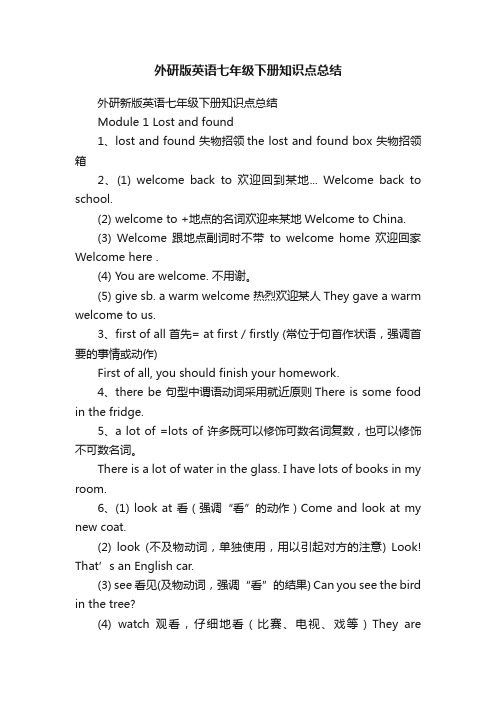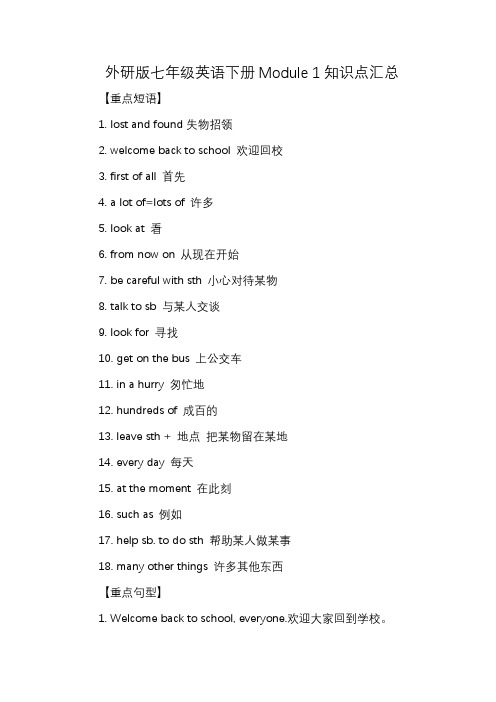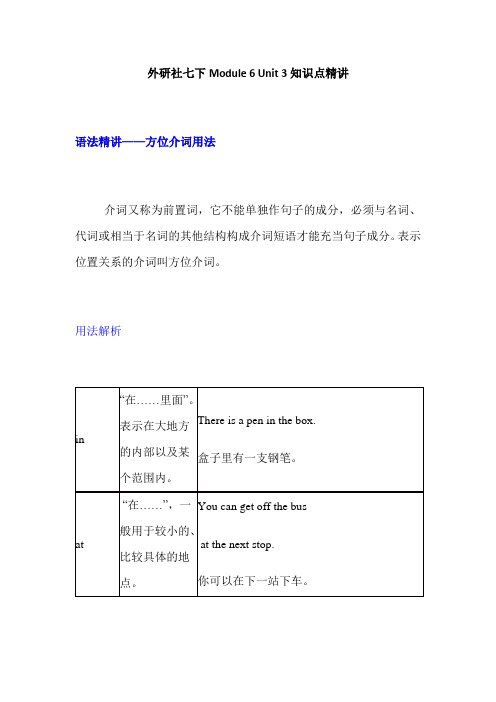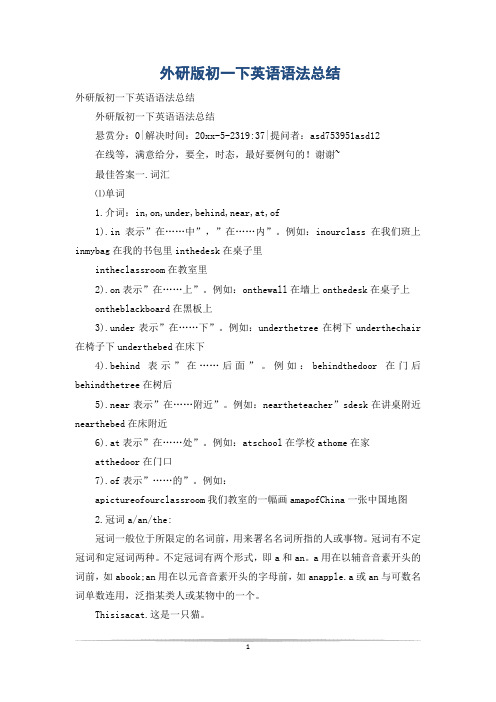外研版英语七下复习介词
初中英语外研版七年级下册M6U1预习指导(知识点+练习题)

七年级英语下册M6U1预习指导一、知识点1.Bank (名词) “银行”;“河岸”Eg: You can fetch money from the bank.你可以从银行取钱。
There is a boy on the bank of the river.河岸边有一个男孩。
2.Go along 沿着...走(多指沿街、道路、河边等往前走)Eg: Go along this street, you will see the market.沿着这条街走,你将看到那个市场。
3.Across (介词) “穿过”-- cross (动词) “穿过”-- crossing (名词) “十字路口”常见搭配:go across the street = cross the street 过马路At the first crossing 在第一个路口Eg: There is an old man crossing the street.有个老人在过马路。
4.opposite (介词) 在…对面= across fromEg: They live opposite the bank.他们住在银行对面。
Opposite (形容词) 另一边的;对面的Eg: We live on the opposite side of the road.我们住在马路对面。
Opposite (副词) 在对面Eg: There is an old man living opposite.对面有一个老人。
Opposite (名词) 相反的人;对立面Eg: “Tall” is the opposite of “short”“高”是“矮”的反义词。
5.In front of ... 在...前面(指外部)In the front of ... 在...前面(指内部)Eg: There is a tree in front of the house.房子外有一棵树。
外研社七年级下册英语专题复习三:介词和介词搭配(包含答案)

知识图谱常见介词搭配知识精讲介词在实际运用中常常和名词、动词、形容词等词类构成固定搭配,这些固定搭配在句子中的表现十分活跃。
一、介词与动词的搭配arrive in/ at到达ask for要,请求do well in在……方面做得好give in投降,屈服go on继续hear from收到……来信hear of听说help sb. with sth. 帮助……做laugh at嘲笑learn from向……学习leave for离开一地去另一地talk to与……谈话go in for从事,参加put up穿上,挂上take down拿下,取了look at(有意识地)看speak to对某人说send for派人去请shout at大声叫喊,吼叫take away拿走,带走think of考虑,关心turn into把……变成wait for等候,等待take off脱下,起飞turn on/ off打开(关上)turn up/ down 调高(调低)listen to听look after照顾,照看look for寻找look like 看上去像get to 到达point to 指向……fill with充满,装满begin with以……开始deal / do with处置,对待meet with偶尔遇见,遭遇pass on传递belong to属于write to写信给……die of死于……depend on依靠,依赖smile at向……微笑believe in信任look out向四下看,小心注意pay for 付钱买……look forward to 盼望,期望二、介词与名词搭配in time及时on time准时,按时in bed卧床in life一生中in front of在……前面on foot步行by bus乘公共汽车at home在家in English用英语in the middle在中间at night在晚上at noon在中午with a smile带着微笑of course当然(可以)in a hurry匆忙,急忙in a minute一会儿by the way顺便问一下at first首先,起初at last最后,终于at the meeting在会上at least至少on one’s way to在……的路上in the sun在阳光下in the tree在树上(外来物)on the tree 长在树上in surprise惊奇地at once立刻,马上at the foot of在……脚下not at all一点也不at dinner在吃正餐at the table在桌子旁at work在工作at school在学校at the back of在……后面at the beginning of在……开始at the end of在……结尾at the same time同时,然而by hand用手,手工,亲手by the end of到……结束时by train乘火车day by day日复一日one by one一个接一个by spaceship乘坐宇宙飞船in a low voice低声地in a word总而言之,一句话in trouble处于困境in fact事实上in the street在街上in the end最后,终于in space在空间in no time立刻,很快in order按顺序,整齐,正常in order to为了,以便in the day在白天in line排成一条直线in a short while不久in all总共,总计in town在城里in silence不作声out of breath上气不接下气out of sight消失,看不见on duty值日on the left/right在左/右边on one hand, on the other hand一方面, 另一方面on the other side of在……的另一边on top of在……顶上in the distance在远处in public当众,公开地out of work失业on the radio通过无线电广播to this day直到今天to one’s surprise/joy使某人吃惊/高兴三、介词与形容词、过去分词或动词等搭配be born in出生于……be good at擅长……be made of由……制成be angry with sb. 对某人生气be angry at sth. 为某事生气be pleased with sb. 对某人感到满意be satisfied with sth.对某事感到满意be surprised at对……感到惊奇/诧异be tired of讨厌……/厌倦……be interested in对……感兴趣be proud of以……为自豪/骄傲be full of充满……take/ catch hold of抓住be sure of确信……take part in参加break into 闯入take care of照顾,关心,保管be busy with忙于……be strict with sb. 对某人严格要求be strict at sth. 对某事严格要求catch up with跟上,赶上have nothing to do with与……无关go to school上学go to bed/ sleep睡觉give a lesson to给……上课go to the cinema 去看电影be kind to sb.对某人友好say hello to向……问好go on strike罢工be used to doing习惯于……be used to do 被用来做某事used to do 过去常常做某事四、看似相同,但意义有别的词组英语中有一些介词词组和动词词组,它们从形式上看基本相同,但在意义上却截然不同。
外研版英语七年级下册知识点总结

外研版英语七年级下册知识点总结外研新版英语七年级下册知识点总结Module 1 Lost and found1、lost and found 失物招领the lost and found box 失物招领箱2、(1) welcome back to 欢迎回到某地... Welcome back to school.(2) welcome to +地点的名词欢迎来某地Welcome to China.(3) Welcome 跟地点副词时不带to welcome home 欢迎回家Welcome here .(4) You are welcome. 不用谢。
(5) give sb. a warm welcome 热烈欢迎某人They gave a warm welcome to us.3、first of all 首先= at first / firstly (常位于句首作状语,强调首要的事情或动作)First of all, you should finish your homework.4、there be 句型中谓语动词采用就近原则There is some food in the fridge.5、a lot of =lots of 许多既可以修饰可数名词复数,也可以修饰不可数名词。
There is a lot of water in the glass. I have lots of books in my room.6、(1) look at 看(强调“看”的动作)Come and look at my new coat.(2) look (不及物动词,单独使用,用以引起对方的注意) Look! That’s an English car.(3) see 看见(及物动词,强调“看”的结果) Can you see the bird in the tree?(4) watch 观看,仔细地看(比赛、电视、戏等)They arewatching TV now.(5) read 看(书、报纸、杂志等) My mother is reading a book /a magazine /a newspaper.7、everyone/everybody 做主语,谓语动词用单数形式。
外研版七年级英语下册Module 1知识点汇总

外研版七年级英语下册Module 1知识点汇总【重点短语】1. lost and found 失物招领2. welcome back to school 欢迎回校3. first of all 首先4. a lot of=lots of 许多5. look at 看6. from now on 从现在开始7. be careful with sth 小心对待某物8. talk to sb 与某人交谈9. look for 寻找10. get on the bus 上公交车11. in a hurry 匆忙地12. hundreds of 成百的13. leave sth + 地点把某物留在某地14. every day 每天15. at the moment 在此刻16. such as 例如17. help sb. to do sth 帮助某人做某事18. many other things 许多其他东西【重点句型】1. Welcome back to school, everyone.欢迎大家回到学校。
2. Please be careful with your things from now on.从现在开始请仔细看管你的东西。
3.Whose gloves are they?它们是谁的手套?4. People often lose things when they’re traveling or when they’re in a hurry. They leave things on planes, on trains, on buses and in taxis. 人们旅行或匆忙时经常丢东西。
他们把东西落在飞机上、火车上、公交车上或出租车里。
5. That’s why there are lost and found office at airports and stations. 那就是为何在飞机场和车站设有失物招领处的原因。
外研版英语七年级下册期末复习专题-方位介词图解与练习

方位介词[教学目标]1.学生能了解一些常用的方位介词分类及其用法,并能够使用 [教学步骤] 1.导入 He drives.He drives on the road. He drives to the school. 方位=方向+位置 2.具体分析(1)表位置(2)表方向3.总结方位介词练习一、根据中文提示,用适当的方位介词填空:1. There is a big pear tree __________ (在……的前面) my house.2. Who was _________ (在……的后面) you when you were waiting in a line?3. What’s _______(在……的下面)the desk?4. The children are playing hide-and-seek. Maomao is hiding himself __________(在……里)the wardrobe.5. The tallest boy in my class sits ________ (在……的隔壁) me.6. They are standing _______ the door. (在……外面)二、用适当的介词填空:1. You can’t see the ball. It’s ______ the door.2. Shall we meet ________ the gate of the cinema?3. Is he playing _______ the street or ______ the road?4. Are they ________ a factory or _______ a farm?5. I sit ________ the twins. The elder sister is _______ my left and the younger one is_______ my right.6. The big tree ______ our classroom is nearly 100 years old.7. The teacher is writing on the blackboard ______ the classroom.8. ---- Where is the light? ---- It’s just _______ the table.9. ---- Where are the lamps? ---- They are _____ the desks.10. A plane is flying ________ the clouds.三、翻译句子:1. 梅梅坐在我的前面,我坐在她的后面。
(完整word版)外研社七年级英语下册Module10-A-holiday-journey知识点复习

MODULE 10 A Holiday Journey1.短语:2.go there 到那里3.enjoy…a lot 非常喜欢… a lot 很, 非常4.drive sb.to…开车送某人去…5.go back to our family home 回到我们家到达: arrive 不及物动词, 接here ,there, home等地点副词时省略介词。
arrive in+大地点arrive in Chinaarrive at +小地点arrive at the schoolarrive homeget 不及物动词get to +地点接地点副词时, 省略toreach 及物动词reach+地点6.the day before yesterday 前天the day after yesterday 后天7.at the airport 在机场8.works of art 艺术作品9.such as 例如10.have dinner 吃晚饭11.take a walk 散步=go for a walk12.street market 街头市场13.do some shopping 购物14.buy…for sb.为…买…15.hope 希望没有hope sb to do sth 这一结构hope to do 希望做…hope +句子16.have to do...不得不做17.wait in line排队等候cut in line 插队18. a special holiday 一个特殊的假期19.Pacific Ocean 太平洋20.on holiday 度假on sale 出售on duty 在值日on leave 在休假on fire 着火21.at the station 在车站22.do different things 做不同的事情23.all day一整天= the whole day24.take lots of photos 照许多照片25.at the top of 在…顶端how long 表示“多久, 多长时间”, 用来提问时间的长短, 常用“for+一段时间”或“since+时间点/一段时间+ago”或“since+从句”作答。
外研社七下Module 6 Unit 3 知识点总结精讲

外研社七下Module 6 Unit 3知识点精讲语法精讲——方位介词用法介词又称为前置词,它不能单独作句子的成分,必须与名词、代词或相当于名词的其他结构构成介词短语才能充当句子成分。
表示位置关系的介词叫方位介词。
用法解析例题1.Walk along the street, and you'll see the hospital ________ your leftA.in B.past C.on D.over (答案C)例题2.The old man is a good swimmer, and even now he often swims ________ Tuojiang River after supper.A.over B.through C.to D.Across(答案D)二、指路和问路1.问路常用语(1)Excuse me.where is the... ?打扰了,……在哪里?(2)Excuse me.is there...near here?劳驾,附近有……吗?(3)Excuse me.can you tell me the way to...?劳驾,你能告诉我去·…·的路吗?(4)Excuse me. how can I get to...?劳驾,我怎样能到达……··?(5)Excuse me.which is the way to...?打扰了,哪一条是去……的路?(6)Where is....please?请问,·····在哪里?(7)Do you know the way to...%?你知道去······的路吗?(8)Can you tell me how to get to...?你能告诉我怎样到达……吗?2.指路常用语(1)Go along/up/down...沿着/向北/向南·····走(2)Turn left./Turn right.左转。
外研版初一下英语语法总结

外研版初一下英语语法总结外研版初一下英语语法总结外研版初一下英语语法总结悬赏分:0|解决时间:20xx-5-2319:37|提问者:asd753951asd12在线等,满意给分,要全,时态,最好要例句的!谢谢~最佳答案一.词汇⑴单词1.介词:in,on,under,behind,near,at,of1).in表示”在……中”,”在……内”。
例如:inourclass在我们班上inmybag在我的书包里inthedesk在桌子里intheclassroom在教室里2).on表示”在……上”。
例如:onthewall在墙上onthedesk在桌子上 ontheblackboard在黑板上3).under表示”在……下”。
例如:underthetree在树下underthechair 在椅子下underthebed在床下4).behind表示”在……后面”。
例如:behindthedoor在门后behindthetree在树后5).near表示”在……附近”。
例如:neartheteacher”sdesk在讲桌附近nearthebed在床附近6).at表示”在……处”。
例如:atschool在学校athome在家atthedoor在门口7).of表示”……的”。
例如:apictureofourclassroom我们教室的一幅画amapofChina一张中国地图2.冠词a/an/the:冠词一般位于所限定的名词前,用来署名名词所指的人或事物。
冠词有不定冠词和定冠词两种。
不定冠词有两个形式,即a和an。
a用在以辅音音素开头的词前,如abook;an用在以元音音素开头的字母前,如anapple.a或an与可数名词单数连用,泛指某类人或某物中的一个。
Thisisacat.这是一只猫。
It”sanEnglishbook.这是一本英语书。
Hisfatherisaworker.他的爸爸是个工人。
the既可以用在可数名词前,也可以用在不可数名词前,表示某个或某些特定的人或事物,也可以指上文提到过的人或事物。
- 1、下载文档前请自行甄别文档内容的完整性,平台不提供额外的编辑、内容补充、找答案等附加服务。
- 2、"仅部分预览"的文档,不可在线预览部分如存在完整性等问题,可反馈申请退款(可完整预览的文档不适用该条件!)。
- 3、如文档侵犯您的权益,请联系客服反馈,我们会尽快为您处理(人工客服工作时间:9:00-18:30)。
外研版英语七下复习介
词
集团文件发布号:(9816-UATWW-MWUB-WUNN-INNUL-DQQTY-
七下复习--介词
in/on/at for by with/without to into over across
along from above up past down upon towards
around through about
单选题
1.There is a big garden _______ many kinds of flowers and trees in our school. They are so beautiful.
A.with
B. for
C. around
D. without
3.The old man is walking ______ the tall building. He is going to see his son.
A. across
B. down
C. through
D. towards
4. Here are some presents ____ you ____ our best wishes.
A.to; with B.for; with C.of; about D.for; for 5.Both Mr Green and Mrs Green were born ____ June, 1956.
A.in B.at C.on D.for 6.The little boy is always interested ______ science.
A.with B.by C.in D.at
7.Li Lei got up ______ seven o'clock ______ Tuesday morning.
A.on, on B.in, in C.at, on D.on, at
8. . He is going to give a talk ______ Western music.
A. about
B. with
C. for
D. by 9.---When were you born? ---I was born ____ August 25, 1983.
A.on B.in C.at D.to 10.The visitors ____ Japan arrived ____ Beijing Station last Tuesday morning. A.from; at B.of; to C.from; to D.of; on 11.The teacher will be back ____ an hour.
A.in B.after C.on D. later 12.He got many gifts _____ his birthday _____ his friends.
A. on, from
B. in, of
C. at, to
D. from, for 13.The classroom is quite different _______ that one.
A. of
B. from
C. with
D. like 14.Look, you'll see a bridge______ the river.
A. on
B. above
C. over
D. in
15. The letter is _____ Tom.
A. for
B. to
C. by
D. from
16. Go ______ Guangming Road, the post office is opposite the bank.
A. across
B. through
C. along
D. around
17. Deng Yaping is famous ______ playing ping-pong.
A. as
B. for
C. with
D. to
18. Everyone is looking forward ______ the beautiful future.
A. for
B. up
C. to
D. at
选词填空
1.The boat is passing ___________ the bridge. 2. They worked from morning ___________ night.
3. There is a bridge ____________ the river.
4. The girls were swimming ______ the river at that time.
5. The boys jumped ___________ the lake.
6. Will you please help me ___________ English?
7. The children often play ___________the playground. 8. The girl is good ____________ the computer.
9. You'd better make the best use ____________your time. 10. I often go to school _______ bike.
11. We have studied English ___________ several years. 12. I met my headmaster ______ my way ______ school.。
